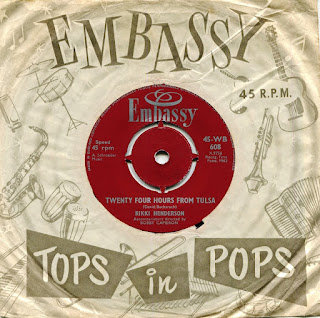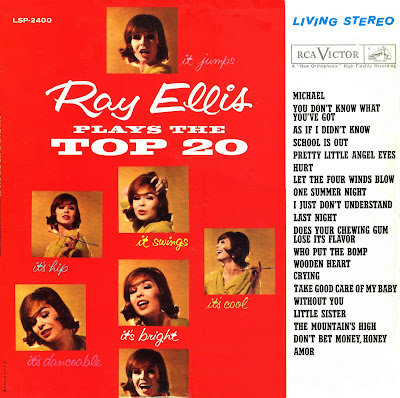Sing along with 1964! I had meant to have this up two days ago, but things don't always happen as planned. (Ever notice that in your life?) And, off topic, I'm not going to believe the reports of a "mothership" in our solar system until a mainstream news outlet confirms such an unlikely event. People predisposed to believe that we're being "visited" will jump on the news without questioning it. I strongly suspect that some genuine astronomical observation has been considerably "tweaked" to fit a popular narrative/trope. By now, we have a public convinced that any unidentified light in the sky somehow satisfies the burden of proof for ET visitation.
Anyway, as musicman1979 aptly predicted, this 1964 Capitol LP is indeed a "1960's version of Karaoke." In fact, Wikipedia has Karaoke (technically) beginning in Japan in 1967, though in the sense of pre-taped band backings. In that sense, it goes back to the early days of rock and roll and lip-synching! As always, the question is, How broadly do we wish do define a piece of technology?
And I haven't fully decided what I think of this album. It's certainly interesting, but it's also odd. Sort of like it's missing something. Wait, I know! Lead vocals! That's it.
And we have to wonder how many purchasers actually sang along with this. For sing-along purposes, Capitol inserted a lyrics sheet, and my copy actually has it, and it's pretty amusing. But scanning the four-sheet insert would require sixteen scanning angles for "stitching," and I just wasn't in the mood.
However, if there's a popular demand for a scan (demand for a scan?), I might relent. Might.
Interestingly, these tracks are sometimes purely instrumental, while others have backing vocals. The reason is fairly obvious: the Beatles numbers (including the Lennon/McCartney Bad to Me) feature unison (same note) lead vocals, along with duets. No way to reduce those schemes to a lead vocal/backing vocal presentation. And I feel the need to define "unison" in music, because the word is so frequently misused: Unison means the same note, typically in the interval of a prime (e.g., Middle C and Middle C) or octave (e.g., C4 and C5). It does not refer to harmony singing which happens on the same beats or syllables, but a person might not know this, given the widespread misuse of the concept. When in doubt, think Gregorian Chant.
So, it's natural that those numbers would be purely instrumental. For tracks which have vocal-harmony backing (Surf City, Bits and Pieces, It's All Right, Heat Wave, It's My Party), we hear those backings. And we are to sing the melody on top of them. Which, with a voice whose resting point lies between baritone and bass, is a chore for me. But I expect the rest of you to sing along. To get the full experience, if for no other reason.
And Capitol pulled a budget label-style bit by promising "the original instrumental arrangements," because this is easily misinterpreted as "the original backing tracks." As in, Capitol licensing and presenting same. Sorry--not the case. Yes, Capitol specifies "arrangements," but a quick read can be deceptive. Meanwhile, the back cover offers a second LP title: Sing the Top-40 Hits, which is a standard budget-label stunt. And, instead of "original" backgrounds, suddenly were dealing with "famous" ones. See? Such behavior wasn't unique to SPC or Big 4 Hits. It leaves us with a fascinating philosophical dilemma: Did the budgets copy "legit" label practices, or vice versa?
"Produced by Dave Axelrod" is all we get in the way of clues, performance-wise--we're hearing whatever studio pros he assembled for this project. Axelrod, of course, was Capitol's A&R man, and Wikipedia tells us that his 1968 Song of Innocence led a contemporary critic to coin the term "jazz fusion." Wow!
Notwithstanding the somewhat fuzzy jacket claims, the tracks are expertly done--arrangement, production, and performance are top-notch, even if I seem to be making fun of things. As pre-Karaoke Karaoke backings, these are pretty amazing. And, best of all, this record "cannot become obsolete." The back jacket says so. This is good, because I worry about vinyl becoming obsolete--I have nightmares about it. Still, I handled this carefully and used the proper tracking force, etc. No point in taking chances.
DOWNLOAD: The Top-40 Song Book (Capitol T-2126; 1964)
Love Me Do, in the style of The Beatles
It's My Party, in the style of Lesley Gore
Bad to Me, in the style of Billy J. Kramer
Bits and Pieces, in the style of The Dave Clark Five
It's in His Kiss (Shoop Shoop Song), in the style of Betty Everett
I Want to Hold Your Hand, in the style of The Beatles
Heat Wave, in the style of Martha and the Vandellas
Surf City, in the style of Jan and Dean
Louie, Louie, In the style of The Kingsmen
It's All Right, in the style of The Impressions
Lee





















